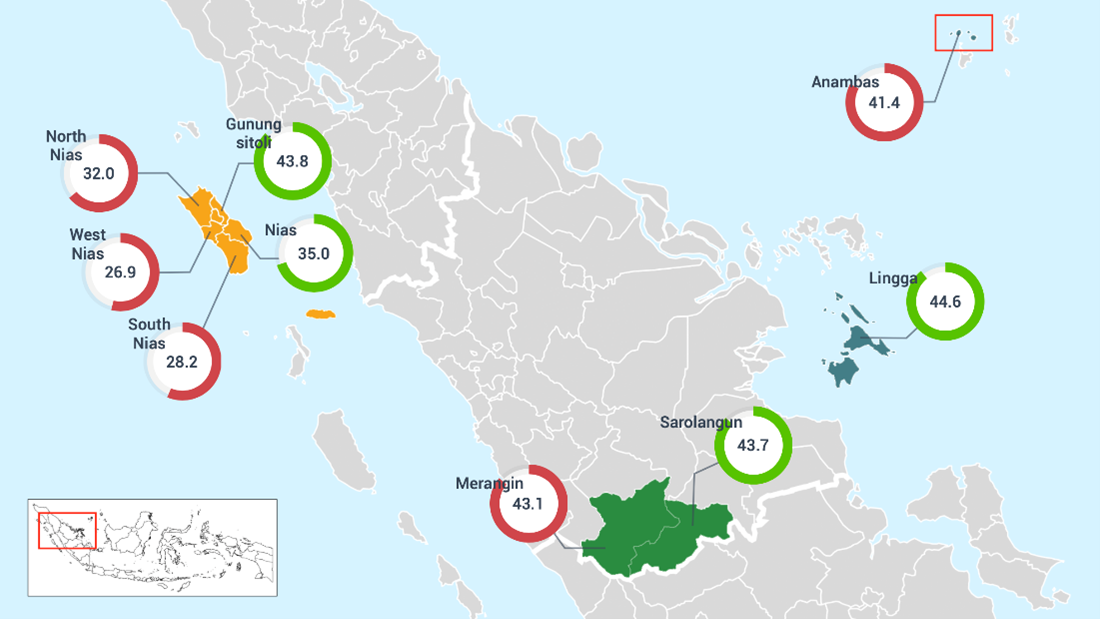Amidst the lush landscapes of Sumatra, the journey towards malaria elimination has seen many achievements, but challenges remain, requiring strategic interventions and concerted action. Despite an annual parasite incidence (API) of less than 1 per 1000 population, signalling low endemicity, many districts and cities in Sumatra grapple with irregular malaria-related activities, shifting human resources, lack of trained microscopists, inadequate malaria case reporting, and poor community involvement in vector control activities. These challenges threaten to stall the course towards malaria elimination in Sumatra.
Indonesia stands at the forefront of its campaign to eliminate malaria, a battle that requires targeted efforts to overcome persistent challenges. While the island of Papua and its surroundings report the majority of cases, certain districts and provinces continue to struggle on the path towards elimination. These areas, despite being categorised as low endemic regions, have yet to achieve the status of malaria-free zones. One such region beckoning for intensified focus is the archipelago of Sumatra.
WHO and IPDCA, known as Perkumpulan Pemberantasan Penyakit Parasitik Indonesia (P4I), provided comprehensive technical support to local health authorities and local communities to accelerate action towards malaria elimination in Sumatra. With a strategic focus on nine priority districts spanning three provinces (Riau Islands, Jambi, and North Sumatra), the stage is set to catalyse meaningful progress in malaria elimination.

Figure 1: Target districts and provinces in Sumatra with assessment scores for malaria elimination readiness as of July 2023.
The initial phase includes using the district readiness malaria elimination assessment that was adapted from the WHO Malaria Elimination Assessment Tool (MEAT) to establish baseline scores. In 2022, five field coordinators implemented activities such as mapping high-risk malaria transmission areas, identifying vulnerable populations, and fostering relations with local governments. However, baseline scores revealed a less optimistic scenario – the target areas scored a combined average of 13.7 out of a possible 50. The assessment revealed that, despite low endemicity, there are systemic challenges at play in Sumatra: activities to address malaria remain infrequent, a shifting workforce, and a lack of trained microscopists that compromises malaria diagnostics.
Based on these findings and recommendations from the assessment, WHO and IPDCA endeavoured to improve the situation and drive tangible changes. Through a series of intensive training sessions in early 2023, a total of 167 malaria programme managers, Puskesmas health workers, field entomologists and laboratory analysts improved their knowledge and skills in malaria microscopy, case reporting, surveillance, migration surveillance and vector mapping. As a result, health workers in the target districts were empowered to establish routine malaria-related activities. Participants also increased awareness of national malaria elimination targets and strengthened advocacy efforts with local authorities across different sectors, such as the office of forestry and agriculture, planning bureau, port health office and health centres, as well as with community and religious leaders. By the end of August 2023, four districts - Lingga (Riau Islands), Sarolangun (Jambi), Gunungsitoli and Nias (both in North Sumatra) – showed major progress as they achieved scores of over 40 out of 50 and are now ready for malaria elimination assessment in 2023. However, the journey ahead for the remaining five districts is prolonged due to indigenous malaria cases, postponing their expected malaria elimination pre-assessment to either 2024 or 2025.
This initiative plays a crucial role in analysing the challenges faced by low endemic or stagnant areas, aiming to propel the districts and cities towards achieving malaria elimination. This effort is in alignment with the broader goal of regional malaria elimination in Sumatra by 2025.
Looking ahead, it is essential to ensure continuity and progress. The effort must be sustained through continued assistance in the districts that have not yet obtained the malaria elimination certificate. To achieve this, fostering collaboration among various programs becomes crucial, ensuring a comprehensive and inclusive approach that reaches remote populations, leaving no one behind. WHO will continue to provide support to ensure strengthened coordination and close monitoring as Indonesia navigates the implementation of malaria activities, guaranteeing their effectiveness and impact. This ongoing commitment underscores the dedication of Indonesia and its partners to achieving comprehensive malaria elimination across all corners of Sumatra.
WHO Indonesia’s malaria programme is supported by the Global Fund to Fight AIDS, Tuberculosis and Malaria.
Dr Ajib Diptyanusa, National Consultant for Malaria; and Dr Herdiana Hasan Basri, National Professional Officer for Malaria; WHO Indonesia.
